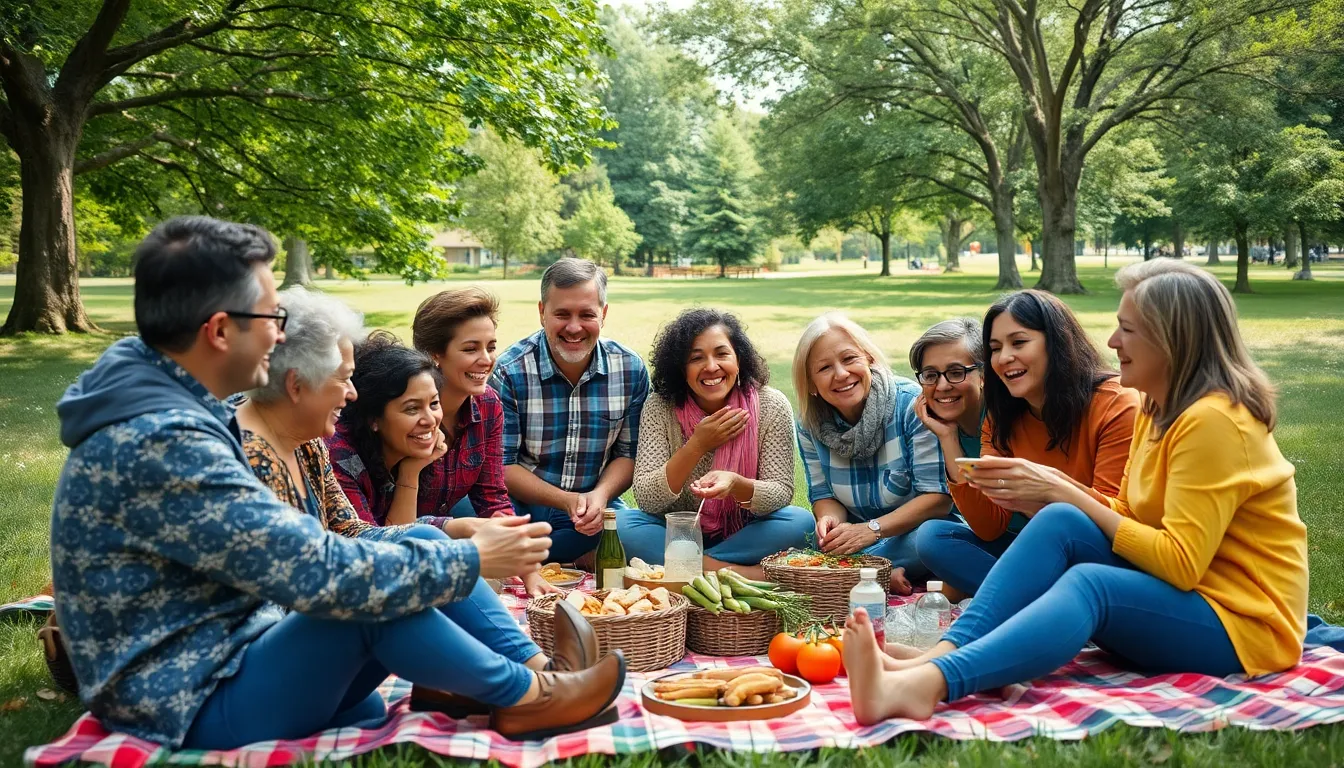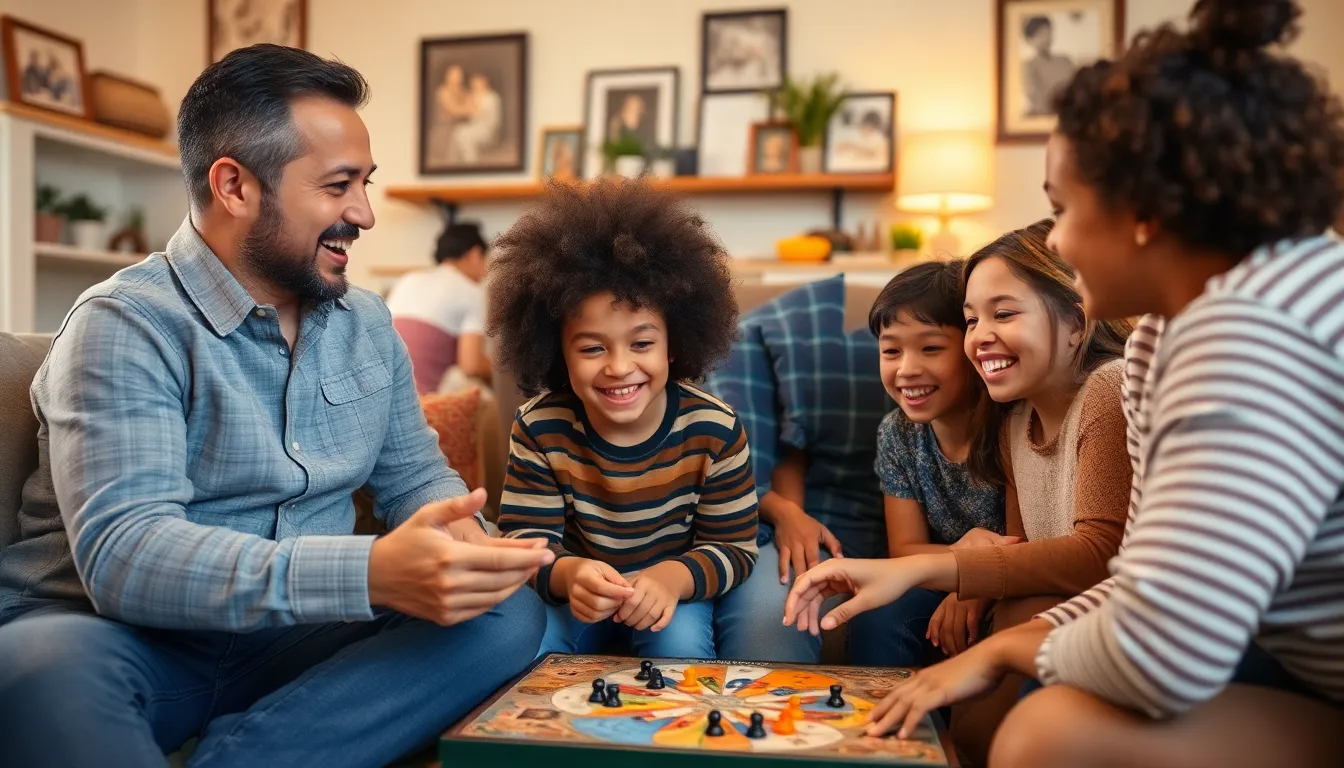In a world buzzing with the latest gadgets and social media trends, it’s easy to forget the timeless rituals that bring people together. Bonding traditions are the glue that holds families and communities together, often wrapped in laughter, love, and a dash of chaos. Whether it’s a quirky family game night or an annual holiday feast that turns into a culinary competition, these traditions create memories that last a lifetime.
Table of Contents
ToggleOverview of Bonding Traditions
Bonding traditions play a crucial role in nurturing relationships within families and communities. They encourage individuals to come together and share meaningful experiences. Examples of these traditions include weekly family game nights, holiday feasts, and seasonal gatherings. Each of these rituals fosters a sense of belonging and stability, especially in today’s fast-paced world.
Many cultures incorporate unique practices that enhance connections among family members. For instance, some families celebrate milestones, such as birthdays and anniversaries, with special rituals that reinforce their bond. Shared meals often serve as a centerpiece for gatherings, creating opportunities for conversations and laughter.
Through storytelling, families pass down values and lessons, ensuring that traditions endure through generations. Engaging in these activities helps individuals reflect on their heritage and strengthen their identity. Rituals often involve both fun and educational elements, making them approachable for all ages.
Communities also benefit from bonding traditions, as they promote unity and cooperation. Local festivals or cultural events bring people together, enhancing social ties. These gatherings showcase diverse traditions, allowing individuals to learn from one another while celebrating their unique backgrounds.
Bonding traditions serve as vital connections for families and communities. They create moments that matter, whether through shared meals, games, or cultural events. The impact these traditions have on relationship-building highlights their significance in a rapidly changing world.
Historical Significance of Bonding Traditions

Bonding traditions carry immense historical significance, reflecting culture and identity across generations. These rituals shape the fabric of communities while influencing personal and collective relationships.
Cultural Influences
Cultural values greatly shape bonding traditions. Festivals, rituals, and communal events often arise from the heritage of a specific group. Customs differ between cultures, showcasing unique ways of celebrating relationships. For instance, in many Indigenous cultures, storytelling embodies both a way to bond and a vehicle for preserving history. Similarly, family reunions in various societies emphasize kinship, allowing members to reconnect and share experiences. Understanding these traditions provides insight into their lifestyles, beliefs, and values. Each cultural practice serves to unite families and communities, fostering a sense of belonging.
Evolution Over Time
Bonding traditions evolve as societies change. Modern technology reshapes how families connect, integrating digital communication into longstanding customs. For example, video calls now complement family gatherings, bridging distances. Over time, traditional celebrations adapt to reflect contemporary values or new family dynamics. New generations often reinterpret customs, blending them with current trends. Retaining essential elements of these traditions ensures their continuity, even amid change. As societies face challenges, bonding rituals increasingly emphasize resilience and support, reinforcing their importance in nurturing relationships. Through this evolution, bonding traditions remain vital in preserving familial ties and communal identities.
Types of Bonding Traditions
Bonding traditions manifest in various forms, each contributing to strengthening relationships within families and communities.
Family-Based Traditions
Family-based traditions hold significant value in nurturing connections. Rituals, such as weekly game nights or holiday feasts, create opportunities for members to gather and enjoy each other’s company. Celebrating milestones like birthdays and anniversaries reinforces familial ties through shared joy. Storytelling during these gatherings passes down values and family history, ensuring that younger generations stay connected to their roots. Families also use these traditions to establish their identity, reflecting unique heritage and culture. These practices cultivate love and support, building a solid foundation that lasts over time.
Community Celebrations
Community celebrations serve as vital moments for social cohesion. Local festivals and cultural events unite diverse groups, allowing participants to engage through shared experiences. Activities like parades, concerts, and craft fairs offer enjoyable ways for individuals to learn from one another. Celebrating cultural heritage fosters pride and belonging, emphasizing the importance of cooperation and unity within the community. These gatherings create memorable experiences and strengthen social networks, ensuring that all participants feel valued and included. Through collaborative activities, communities form resilient bonds that contribute to collective well-being.
Modern Adaptations of Bonding Traditions
Modern bonding traditions evolve alongside society, adapting to current needs and influences. Families incorporate technology into their rituals, making connections easier and more widespread.
Influence of Technology
Digital platforms enable families to maintain relationships despite geographical distances. Video calls replace in-person gatherings, allowing for virtual game nights or shared meals. Social media facilitates sharing of milestones, creating a dynamic way to celebrate achievements. Online narratives capture stories, making them accessible for future generations. Technology also offers platforms for digital storytelling, preserving cultural values and enhancing engagement among family members.
Globalization Effects
Globalization introduces diverse bonding traditions into various communities. Families blend customs, enriching their rituals with practices from different cultures. This cross-cultural exchange fosters understanding and unity among groups. For instance, cities host multicultural festivals, showcasing a variety of traditions that promote social interaction. Individuals gain exposure to unique customs, leading to broader perspectives on family and community values.
Bonding traditions are vital in today’s fast-paced world. They create connections that enrich relationships and foster a sense of belonging. Whether through family gatherings or community celebrations, these rituals provide opportunities for shared experiences and meaningful interactions.
As society evolves, so do these traditions, adapting to modern needs while preserving their essence. The integration of technology allows families to maintain connections across distances and encourages the blending of diverse customs.
Ultimately, bonding traditions not only nurture individual relationships but also strengthen communities, promoting unity and understanding among different cultures. Embracing these practices ensures that cherished memories and values endure for generations to come.






